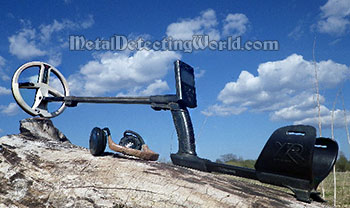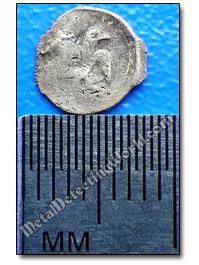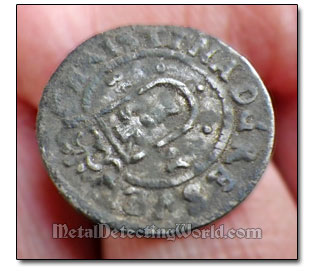Tips for XP Deus Users: Speed Up Your Climbing of the Deus' Learning Curve, Dealing with Modern and Old Trashy Hunt Sites
(...CONTINUED from Previous Page)

How To Climb Deus Learning Curve Fast
You can spend less time for "climbing" the extremely steep Deus' Learning curve if you do the following:
1) Read, reread and reread the Instruction Manual as many times as necessary to understand and memorize all settings and modes, and how they interact with one another. Of course, the latter could be accomplished only through actual experimentation under real conditions in the field.
The Deus' instruction manual is not an easy read even for an experienced detectorist not because it is written in inadequate terminology and missing important points, but also because some Deus' features can not be associated with similar features of other metal detectors that you have previously used and learnt very well. In other words, start learning the Deus' settings from the scratch. Same goes for sound patterns of the Deus' responses to both good and bad "questionable" signals.
2) Conduct a simple, classic Air Test with desirable targets that you are going to seek and write down their VDI (Visual Display Indication) numbers, so that you can properly set up the tonal zones on the Tonal Discrimination scale. Please also refer to my article specifically written on the air test for XP Deus -
XP Deus Air Test and Sergei's 100-Target VDI Chart for Jewelry, Coins and Relics
It is also important to choose tone pitches that are the most comfortable for your hearing, assign them to certain conductivity ranges (tonal zones), and keep these tone pitches unchanged. This way, you will get used to the tones and train your ears to the sound characteristics of target responses faster.
Two more Tests/Methods are used for fine-tuning the Deus, but their descriptions are out of scope of this article and will be explained in my other articles when I get to writing them.
3) In the beginning, dig up most of detected targets to learn your Deus' "slanguage". Only after you attain the basic knowledge of detector's audio responses to common targets in your search area, you may start experimenting with programmable settings. To complete this learning part fast, use one of the Deus' factory-preset programs - the one which is suitable for the targets you intend to search for.

For example, to find a tiny hammered coin (like the one shown on a picture), assuming that your search area contains them, the program 3 - "DEUS FAST", should be implemented, or, at least, used as a basis for your own customized search program. The "DEUS FAST" program would be the most appropriate to start with because it utilizes the high 18 kHz operating frequency which makes the Deus extremely sensitive to targets that are as small as 3mm in diameter.
For those who had previously used the XP GMaxx or GoldMaxx Power metal detectors, the Deus' has "G-MAXX" and "GMPOWER" factory-preset search programs along with seven more factory-preset programs - to help a beginner start detecting and find coins under various detecting conditions off the start. One of the useful learning techniques is the Program Fast Switching which is explained in my article: Fast Switch Between Deus' Search Programs
4) Make it your habit to experiment with settings and adjust them according to metal detecting conditions at every hunt site you visit. Fine-tuning the Deus is the must because it is essential for the Deus' optimal performance and, therefore, your successful Deus experience. This machine has all necessary features for fine-tuning it under any metal detecting conditions! And, yes, you must do it at EVERY hunt site you visit!
with Multi-Frequency FBS Metal Detectors
Dealing with Modern and Old Trashy Hunt Sites

To a beginner Deus user searching for valuable targets with high VDI values, a small disadvantage may manifest itself when he/she hits the spot infested with modern trash which also has high-conductive properties and, therefore, could not be rejected. Also, numerous non-ferrous junk targets of low conductivity could not be rejected as well because they "share" the same segment with the low-conductive coins (small and thin-sectioned silver and gold specie) on the Discrimination scale, and, therefore, have to be dug up.
At first, the novice's time efficiency at this spot would drop to zero, and one could either get exhausted recovering the junk targets or just leave the spot.
But this unpleasant situation will stop occurring as soon as the beginner-user attains enough knowledge of the Deus audio through practice and lots of target digging, and begins to recognize subtle differences in the Deus audio responses to the non-ferrous junk targets and valuable targets within the same conductivity range. And the time efficiency of the Deus v3.2 in the field may certainly surpass the time efficiency of an operator of the most advanced multi-frequency metal detector if such a detector is operated in Auto GB and Auto Tracking modes.
The multi-frequency metal detectors with a 2-Dimensional Discrimination scale showing the targets' FE values can ignore the unwanted targets and still "catch" the desirable targets, but not all of them if a metal detecting site is littered with iron nails, slug and fragments of the old, "signal-triggering" bricks and contains sporadic mineralization! Even if used with a small search coil, such detectors lose to the XP Deus in a number of good finds big time due to the low, factory-preset level of Reactivity.
If a Deus V3.2 user searches for the valuable targets of high conductivity at the old-homestead site containing lots of old ferrous targets, the Deus' advantage becomes even greater! This is why locations of the former settlements littered with old junk are the "habitat" of the Deus V2.0-3.2. And there is no doubt about it! All you have to do is to understand the Deus' revolutionary concept of the Tonal Discrimination and Reactivity, and master a simple and effective search technique.
After having analyzed the test results and the Deus' performance, I came to the following conclusion: if the Deus V2.0-3.2 is fine-tuned and operated by an experienced user, it can compete with the dual- and multi-frequency machines (including the FBS all-purpose land metal detectors) that had been "ruling" the market since the 2000s.
For its time (the 2010s), the Deus V2.0-3.2 rightfully set a new standard for a single-frequency, all-purpose land metal detector. What does this standard consist of? It is the Deus' flexibility in being adjusted to most metal detecting conditions (saltwater is not included), its flawless stem/handle assembly design that had been only dreamt about prior to the Deus appearance, and its totally wireless operation.
Troublesome Transformation of XP Deus Began in 2017
My troubles with the Deus began in March of 2017 when XP released the V4.0 firmware version, and I installed it on my Deus. Prior to that moment, I have used the V3.2 firmware which was a fix to a previous V3.0 version which failed to bring any successful performance.
But the v4.0 turned out to be worse than the V3.0 due to numerous bugs and unstable, unacceptable performance of the Deus. Perhaps the XP designers were in such a hurry to release a new version of the Deus - the "gold-oriented" one, along with the "white" High Frequency (HF) search coils designed for gold nugget hunting that they failed to bring the Deus' key functions in line.
This especially concerns the 'Ground' function being too sensitive and not working in tune with a Discriminate circuit of the Deus which became unstable and would produce a lot of false signals because of that.
My Latest Update - Deus V4.1-5.2 (2019):
Most problems of the V4.0 version were addressed in a subsequent firmware beta-versions and a new version V4.1; however, this version was not without issues.
The next version V5.0 was released to fix them and accommodate the new marketed x35 Low Frequency (LF) search coils. Like all Deus search coils, these coils are actual metal detectors (the Deus detector is its coil if you did not know) sold at a price of a mid-range detector. The version V5.0 also got additional bugs and issues.
Then there was a version V5.1 followed by a few V5.1x-betas... Currently it has been the V5.2...
If you look at the final outcome of this bizarre bug-fixing "epoch", it is pretty depressing: the wonderful Deus V2.0-3.2 has evolved into a less-performing, overcomplicated detector that still operates on a single frequency and comes with either the HF gold-prospecting coil specifically designed for tiny, shallow targets, or the x35 search coil giving just an additional half an inch of detection depth...
And what is even worse, the old good legacy coils were discontinued by XP; thus, eliminating the possibility for Deus owners to use any of only two effective software versions V2.0 and V3.2.
XP claims that those Deus V4.1-5.2 users who miss the V2.0 or V3.2 versions can simply select "DEEP" or "FAST" factory preset programs which have filters of the V2.0 and V3.2 respectively, and be "happy campers". Well, this claim is far-fetched!
The performance of the Deus V4.1 set in either "DEEP" or "FAST" is not even close to the performance of a real Deus V2.0 or V3.2 respectively. The reason for that is simple: while the filters are identical, the operating platform's characteristics are not and negatively affect the Deus V4.1-5.X's performance.
Unfortunately for Deus users, every new released firmware version contained additional features and functions incorporated to solve problems that appeared in previous releases.
The number of such functions has increased with every subsequent firmware version released; thus, making it harder for users to learn and master the Deus. In comparison to the most successful firmware version V2.0 of the Deus incorporating only 29 features, the version V5.2 is bloated with 58 (!) features, functions and modes.
Besides, the more features and functions in the detector, the higher the likelihood of terrible user errors occurring during the search program customization and fine-tuning the detector. The Deus does not forgive even the smallest mistakes made by the user during numerous search-program-setting adjustments. More information is given in detail in my article -
The Truth About XP Deus
10 years ago, it would take an average Deus user two metal detecting seasons to learn and master the Deus V2.0. Today, I am afraid to guess... at least 3 or 4 seasons?!
Out of my conversations with the Deus users in the field, I can tell that on average only 2 out of 10 Deus owners understand how various features and functions of the Deus influence one another and eventually the detector's performance under various metal detecting conditions.
These detectorists use their own customized search programs. The remaining eight would employ either the factory preset search programs or customized programs posted on the Internet, and, as a result, get mediocre results, or no results at all.
Despite all that hype about the Deus, many people have turned away from the Deus because of its complexity and problematic firmware. Not to mention many users' negative opinion on XP's practice of using the Deus owners as "experimental rats" for testing the buggy firmware in the field instead of hiring a team of professional testers and software designers who could easily make the Deus firmware 100% functional, complete and effective before releasing it. As for the former die-hard Deus V2.0-3.2 fans, those still having the "black" legacy coils, they simply rolled back to either the V3.2 or the V2.0 version.
I did so too but had to eventually quit the Deus for other reasons such as the Deus unreplaceable built-in Li-Po batteries powering its coils (actually the batteries can be replaced in HF coils but not in x35 coils), headphones and remote control, which lost most of their capacity after a few years of intense use, troublesome battery charging system, not-long-lasting foldable WS-4 headphones, and poor, unhandy user-interface which caused me a lot of aggravation and reduced my time-efficiency in the field, just to name a few.
And I simply got mentally tired of fine-tuning the Deus to every hunt site I visit in order to get satisfactory results.
Now I'm getting better results (tripled finds rate!), especially at the "pounded" sites, with a different metal detector.
My new "workhorse", despite having a price tag of one Deus coil, allows me to do the following: 1) greatly increase my time efficiency in the field, 2) have more metal detecting time without constant programming (optimizing my search programs) and tuning the detector, 3) implement a wider variety of search coils ranging from 5" to 15" in sizes, 4) not to worry about ending up with a powerless detector in the middle of the hunt if the batteries unexpectedly go flat, and I do not have a powerbank to charge them, 5) forget about bothersome special maintenance of the Li-Po batteries, etc.
And this machine has one fantastic search mode with which even the laziest detectorist can easily find a coin cache or any other deeply buried treasure! I know you are probably wondering what machine is that? It is Fisher F75 Plus.
The Deus' performance could not match the F75+'s performance during comparative tests which I ran at various hunt sites and on my test grounds under different detecting conditions. And it is not just me who noticed the F75+ scoring higher than the Deus V4.1-5.X in number of finds at 'difficult' hunt sites.
I have been getting emails from many detectorists reporting that, in fact, the Deus is now outperformed by the latest detector-models of a few md manufacturers such as First Texas Products, Minelab and Nokta | Makro. This would not happen if the XP engineers took the right direction in developing and improving the Deus as a metal detector for coin shooting and relic hunting - this is what the Deus (V2.0-V3.2) initially was, and paid attention to demands and needs of the Deus users, starting a few years back.
As the metal detecting reality constantly changes for the worse, new technological solutions must be implemented in modern metal detectors to make them not only competitive on the market, but also capable to produce gratifying results for their users mainly detecting at the "searched-out" sites.
Unfortunately, in my opinion, XP took a wrong "path" by turning the Deus into a gold-prospecting unit that is not suitable for an average coin and relic hunter, and did not add any tech innovations to the Deus for a decade. And now, the feature-crept, "modernized" Deus V5.X does not meet all requirements imposed by the new metal detecting reality.
The Deus V4.1-5.X will do a great job at trashy sites since it has a few settings of high Reactivity (recovery speed). On plowed fields, the Deus V4.1-5.X will be on par with other advanced machines because the plowed fields are periodically replenished with coins and relics brought up to the surface by plows.
At the 'undisturbed' search grounds such as hunt sites located in areas with rough terrain, wooded areas or pastures, the Deus V4.1-5.X will be able to detect some deep targets but will not do as good as the advanced detectors of the above-mentioned brands.
While detecting at hunt sites that have been previously searched by enthusiasts with the more capable machines, the average Deus user will be extremely lucky to detect "goodies" at intermediate depths, which were accidentally missed by previous searchers.
Good luck and happy hunting!
Back to "My Metal Detectors" Main Page
You may want to visit my index page containing my articles, guides and tutorials on the XP Deus metal detector and its accessories: XP Deus Articles, Tutorials and Guides